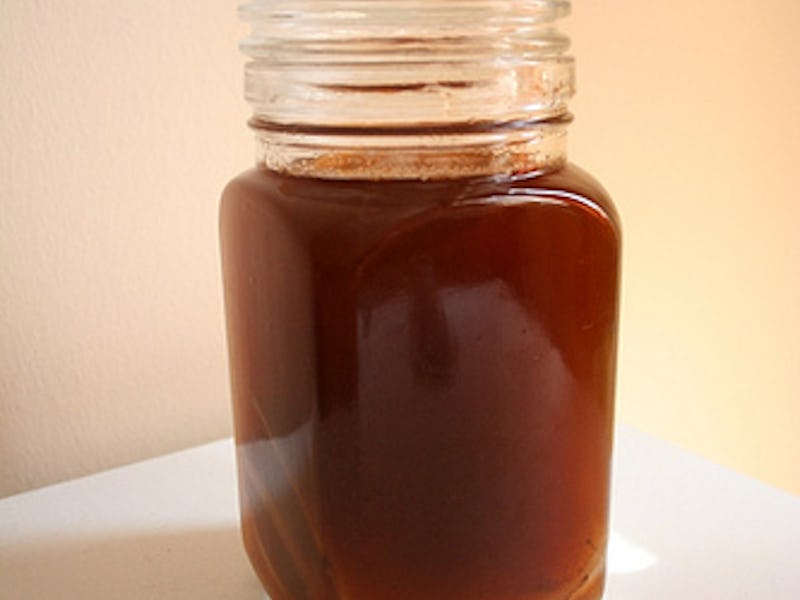Let’s get one thing out of the way: Most kombucha — that fizzy tea all your hip friends are glugging — is not liquor, despite it being a tea fermented with yeast and bacteria.
The drink’s presumed healthiness, particularly for the gut, has made it the it drink for Millennials who are willing to cash out around four bucks a pop for it. It’s also got a cool kid cache due to its fermentation, which technically produces enough alcohol to warrant warning labels for pregnant women and get you ID’d at the cash register when purchasing the stuff.
But kombucha’s not going to get you drunk. It contains only a trace of alcohol — less than one percent by volume. So if you want to get drunk, you’re going to need to drink a shitload of it.
It can contain higher levels of alcohol, but to achieve those levels, you have to be trying to get there. That means you’ve either bought a bottle of it intentionally (and it’ll be clearly labeled), or you’ve diverted from a normal kombucha recipe while brewing at home. In the latter case, you’re probably an experienced brewer.
What is Kombucha, anyways?
Kombucha, a lightly carbonated, mildly vinegary beverage, is the product of sugary tea that’s been fermented by bacteria and yeast. A kombucha culture, or “mother,” is known by many as a SCOBY — Symbiotic Colony of Bacteria and Yeast. The amount of alcohol in the beverage depends on the relationship among these microorganisms.
A kombucha culture, or mother, also known as a SCOBY, is a symbiotic colony of assorted bacteria and yeast. It may or may not be from space.
The bacteria and yeast in the SCOBY survive and multiply by feeding on sugar and the chemical components present in tea. In a comprehensive kombucha paper published in 2000 in the journal Food Research International, scientists described all the microbes that commonly make up a SCOBY. The bacteria they found include Acetobacter xylinum, A. xylinoides, Bacterium gluconicum, A. aceti, and A. pasteurianus. The yeasts they identified were Schizosaccharomyces pombe, Saccharomycodes ludwigii, Kloeckera apiculata, Saccharomyces cerevisiae, Zygosaccharomyces bailii, Brettanomyces bruxellensis, B. lambicus, B. custersii, and Candida and Pichia species.
Okay, that’s a long list of microbes, but what does it mean? There are usually only a few types of bacteria or yeast in a SCOBY, sometimes as few as one of each. While the composition might alter the flavor a little bit, the general function remains the same; yeast cells break down sugar (sucrose) into its two component parts: glucose and fructose. From there, they metabolize glucose and fructose to produce ethanol and carbon dioxide. Ethanol, as you may know, is alcohol. And yes, it’s the kind that gets you drunk when you drink it. Carbon dioxide gives the drink its signature effervescence.
The bacteria, which are the same species that produce vinegar, convert glucose to gluconic acid and fructose into acetic acid. These are the components of kombucha that yield the vinegary taste that some people find weird.
But here’s the cool part: The bacteria consume the alcohol, too. Therefore, kombucha naturally balances itself out to contain a low level of alcohol.
If, for some reason, the yeast are metabolizing at more than their normal rate, they might produce more alcohol than the bacteria can consume. One of the reasons this can happen is that the temperature is too high since the yeast in kombucha thrive at a higher temperature than the bacteria. But commercial kombucha manufacturers typically produce their brew under controlled conditions, which means this is unlikely.
Of course, some people might want more alcohol in their kombucha. If that’s the case, they can make it happen. Usually this means adding an additional type of yeast and more sugar. More yeast, as we know, means more alcohol. The final product will still taste like kombucha, but it might end up also tasting like a sour beer.
So, if you’re worried about alcohol in kombucha, rest easy knowing there isn’t much.
